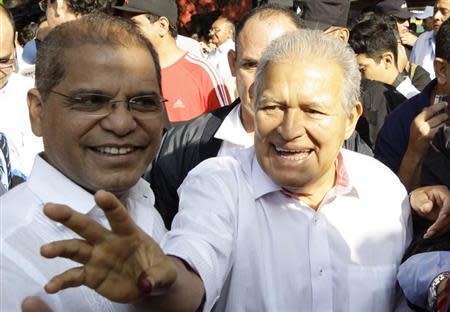Ex-rebel claims El Salvador election win, rival cries foul

By Nelson Renteria and Michael O'Boyle SAN SALVADOR (Reuters) - A former Marxist guerrilla leader claimed a narrow victory in El Salvador's presidential election run-off on Sunday but his conservative rival warned of fraud and insisted he was the winner. Salvador Sanchez Ceren of the ruling Farabundo Marti National Liberation Front (FMLN), which fought a series of U.S.-backed governments in a 1980-1992 civil war, won with 50.11 percent support, the election tribunal's preliminary results showed. His right-wing challenger Norman Quijano, a former mayor of San Salvador, had 49.89 percent and the two men were separated by just 6,634 votes. The unexpectedly close race raised tensions in a country still sharply divided between left and right more than two decades after the civil war ended with peace accords. An angry Quijano, 67, accused the election tribunal of corruption and hinted at foul play. "We are not going to allow fraud .... We are 100 percent convinced that we have won," he told his supporters. "Our armed forces are watching this process." Sanchez Ceren, who was forced into the run-off after falling just short of a first-round victory last month, celebrated with his supporters late on Sunday night. "We won the first round, and now we have won again in the second," he said. "We have to keep working against poverty ... The people have decided to continue along the road of change." The election tribunal earlier said Sanchez Ceren's lead was undisputable but stopped short of declaring him the winner, saying it needed to complete a formal count and study challenges to individual ballots. It was not clear how long that would take. Sanchez Ceren won 49 percent in the first round of voting last month, about 10 percentage points ahead of Quijano from the right-wing Nationalist Republican Alliance (Arena) party. Although that wasn't enough to avoid a run-off, Sanchez Ceren was in a strong position ahead of Sunday's vote and polls showed him as the clear favorite with about 55 percent support. Quijano picked up support from moderate conservatives in the last month, however, by painting Sanchez Ceren as a communist with blood on his hands who would drag El Salvador hard to the left. A Sanchez Ceren victory would give the FMLN a second consecutive term and the affable, media-shy 69-year-old has vowed to build on its social programs, which include a glass of milk a day for children and free school uniforms, shoes and supplies. In a country where a third of people live in poverty and many rely on money sent by relatives living in the United States, the FMLN's social programs are popular. "I have seen a change under this government," said Carlos Cornejo, a 20-year-old medical student, as he voted for the first time shortly before polls closed on Sunday. "What lots of us want is for the welfare schemes to keep flowing." FEARS OF SOCIALISM Tapping into middle-class fears, Quijano warned that Sanchez Ceren would bow to the influence of Venezuela, where the socialist government has taken over private companies. "I'm worried about my job. I feel my job is at risk," said Cecilia Morales, a 35-year-old mother of three who works at a milk processing plant in the capital whose owners are linked to the political right. "They could take over their businesses." El Salvador has remained a polarized society since the civil war, which killed about 75,000 people and left many with a deep distrust of the former rebels. A carpenter's ninth son, Sanchez Ceren was a rural school teacher before joining the FMLN guerrilla movement and he then rose to lead one of its five main factions during the war. Along with other FMLN leaders, he has moderated his policies since the peace accords were signed in 1992 and the rebel group became a political party. Speaking earlier on Sunday to supporters, Sanchez Ceren said Quijano should not hesitate to recognize the FMLN's victory but that he was ready to work together with his adversary. "The country needs all forces to unite," he said. "We are going to continue to build opportunities for the poorest." The FMLN has steadily gained ground in the last decade, winning elections for mayors across the coffee-producing nation in areas that were once bastions of El Salvador's right. It took the presidency in 2009 when Mauricio Funes, a prominent journalist who had no role in the war, ran as its candidate. Under the FMLN, the government says the poverty rate has fallen from 40 percent to 29 percent. Its welfare policies are popular but they have also contributed to a sharp rise in the country's debt, and economic growth has been weak. Today, the wealthy live in gated communities and shop in lavish malls filled with U.S. chain stores under the watch of armed guards. The poor, meanwhile, struggle in neighborhoods of cinder block homes controlled by violent street gangs. (Additional reporting by Noe Torres in San Salvador and Dave Graham, Alexandra Alper and Julia Symmes Cobb in Mexico; Writing by Simon Gardner; Editing by Kieran Murray)

